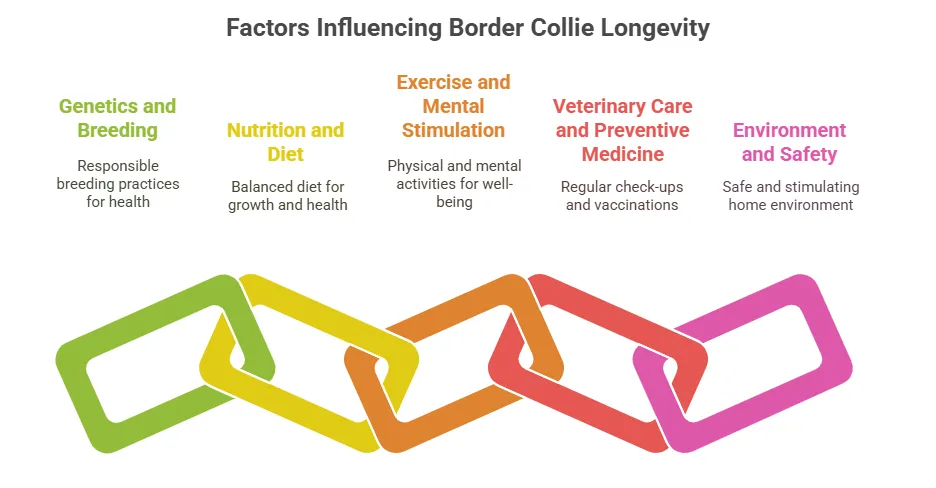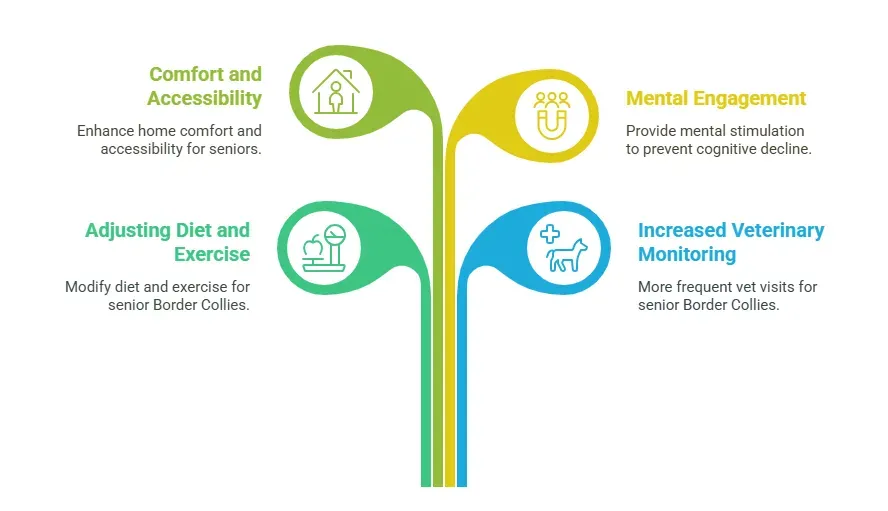A Border Collie typically lives between 10 and 14 years. Their lifespan depends on several key factors like genetics, diet, exercise, and proper veterinary care. With excellent care, many Border Collies can enjoy a long, healthy, and active life.
Border Collies are known for their incredible intelligence and boundless energy, making them truly special companions. If you’re a Border Collie owner or thinking about getting one, you’re probably wondering, “How long can I expect my clever friend to be by my side?” It’s a common and important question, and understanding their average life expectancy, along with the factors that influence it, can help you provide the best possible life for your dog. You’re in the right place to get clear, practical answers that will help ensure your Border Collie thrives for years to come.
The Average Border Collie Life Expectancy
Border Collies are known for their hardy nature and generally good health. On average, a Border Collie can expect to live between 10 and 14 years. This range is typical for many medium-sized dog breeds. While some Border Collies might live a bit shorter, others, with excellent care and a bit of luck, can happily live into their mid-teens, sometimes even reaching 17 or 18 years old. Understanding this average life expectancy is the first step in appreciating the long and active life your Border Collie can have.
Key Factors Influencing Border Collie Longevity

Many different things play a role in how long and how well your Border Collie lives. It’s a mix of genetics, lifestyle choices, and the care they receive throughout their lives. By focusing on these key areas, you can greatly improve your dog’s chances of a long and healthy life.
A. Genetics and Breeding
The foundation of a long life often starts with good genes. Responsible breeders play a crucial role in reducing the risk of inherited health problems in Border Collies. They test their breeding dogs for genetic conditions common in the breed. This helps ensure that puppies are born with the best possible genetic blueprint for health. Choosing a puppy from a reputable breeder who prioritizes health testing is a big step towards a healthy future for your dog. For more information on responsible breeding practices, you can often find resources from organizations like the Orthopedic Foundation for Animals (OFA).
B. Nutrition and Diet
What your Border Collie eats directly impacts their health and lifespan. A high-quality, balanced diet provides all the nutrients they need to grow, maintain muscle, and support their immune system. Just like humans, dogs need the right fuel. Avoid overfeeding, as obesity is a significant health risk for dogs, leading to joint problems, heart disease, and diabetes. Always choose age-appropriate food – puppy, adult, or senior formulas – and consult your veterinarian for advice on the best diet for your specific dog. The American Veterinary Medical Association (AVMA) offers useful guidance on pet nutrition.
C. Exercise and Mental Stimulation
Border Collies are incredibly active and intelligent dogs. They thrive on physical exercise and mental challenges. Without enough activity, they can become bored, destructive, and even develop behavioral issues. Regular, vigorous exercise helps maintain a healthy weight, strengthens their heart and muscles, and keeps their joints flexible. Think long walks, runs, fetch, or even dog sports like agility. Mental stimulation, through training, puzzle toys, and learning new commands, is just as important. A well-exercised and mentally engaged Border Collie is a happier and healthier one.
D. Veterinary Care and Preventive Medicine
Regular trips to the veterinarian are essential for your Border Collie’s long-term health. Routine check-ups allow your vet to catch potential health issues early, often before they become serious. Vaccinations protect against dangerous diseases, and parasite control (for fleas, ticks, and worms) prevents infestations that can lead to significant health problems. Your vet can also advise on proper dental care, which is vital as poor dental hygiene can affect overall health. Consistent preventive care is one of the most effective ways to add healthy years to your dog’s life. The American Animal Hospital Association (AAHA) provides excellent resources on pet health.
E. Environment and Safety
A safe and stimulating environment is crucial for your Border Collie’s well-being and longevity. This includes preventing accidents by “dog-proofing” your home and yard, removing harmful substances, and securing your property. Border Collies, with their inquisitive nature, can sometimes get into trouble. Providing a stress-free home where they feel secure also contributes to their overall health. Consistent training and supervision, especially during outdoor activities, can prevent unfortunate accidents.
Border Collie Lifespan at a Glance
| Aspect | Details |
|---|---|
| Average Lifespan | 10–14 years (some live up to 17–18 years with excellent care) |
| Key Longevity Factors | Genetics, diet, exercise, mental stimulation, veterinary care, environment safety |
| Common Health Issues | Hip/Elbow Dysplasia, Collie Eye Anomaly, Epilepsy, Hypothyroidism, Cancer |
| Senior Dog Care | Adjust diet/exercise, more frequent vet visits, orthopedic bedding, ramps, mental engagement |
| Best Practices for Longevity | Choose reputable breeder, feed quality diet, regular vet care, daily physical and mental activity, safe and stress-free living environment |
Common Health Issues Affecting Border Collie Lifespan
While Border Collies are generally healthy, like all breeds, they are prone to certain genetic and acquired health conditions. Being aware of these can help you recognize symptoms early and seek timely veterinary attention, which is key to managing them and maintaining your dog’s quality of life.
A. Hip and Elbow Dysplasia
These are orthopedic conditions where the joints don’t develop properly, leading to pain and arthritis. Border Collies can be affected, though responsible breeders screen for these conditions. Symptoms include limping, difficulty getting up, and reluctance to exercise. Early diagnosis and management can help improve your dog’s comfort.
B. Collie Eye Anomaly (CEA) and Other Eye Conditions
Collie Eye Anomaly is a genetic eye condition that can range from mild vision impairment to blindness. While often not progressive, it’s something responsible breeders test for. Border Collies can also be susceptible to other eye issues, such as progressive retinal atrophy (PRA), which can lead to blindness. Regular eye exams are important. The American College of Veterinary Ophthalmologists (ACVO) has information on various eye conditions.
C. Epilepsy
Epilepsy is a neurological disorder that causes seizures. It can be inherited in Border Collies. While there is no cure, medication can often control seizures, allowing affected dogs to live relatively normal lives. If you notice your dog having unusual episodes or seizures, it’s vital to contact your veterinarian immediately.
D. Hypothyroidism
This is a condition where the thyroid gland doesn’t produce enough hormones, leading to a slowed metabolism. Symptoms can include weight gain, lethargy, hair loss, and skin problems. It is typically managed with daily medication, and dogs on treatment can lead full, healthy lives.
E. Cancer
Unfortunately, cancer is a leading cause of death in older dogs of all breeds, including Border Collies. Early detection is crucial for successful treatment. Any new lumps, unexplained weight loss, changes in appetite, or unusual behaviors should be brought to your veterinarian’s attention. Regular vet check-ups can sometimes help identify suspicious areas before they become advanced.
Caring for an Aging Border Collie: Extending Their Golden Years

As your Border Collie enters their senior years (typically around 7-8 years old), their needs will change. Adapting your care routine can significantly improve their comfort and extend their healthy lifespan, allowing you to enjoy many more precious moments together.
A. Adjusting Diet and Exercise
Senior Border Collies might need fewer calories to avoid weight gain, as their metabolism slows down and their activity levels may decrease. Switching to a high-quality senior dog food, which often has different nutrient balances and joint support, can be beneficial. While intense exercise might be too much, regular, shorter, and gentler walks are still very important to maintain muscle mass and joint flexibility. Listen to your dog and adjust activities based on their energy levels and physical condition.
B. Increased Veterinary Monitoring
As dogs age, they are more prone to health issues. Senior Border Collies should have more frequent veterinary check-ups, often twice a year instead of annually. These visits allow your vet to monitor for age-related conditions like arthritis, kidney disease, heart problems, and cancer. Early detection of these issues is key to effective management and can significantly improve their quality of life and longevity.
C. Comfort and Accessibility
Make your home more comfortable and accessible for your aging Border Collie. This might include providing orthopedic dog beds to support aging joints, using ramps or steps to help them get onto furniture or into cars, and ensuring easy access to food, water, and outdoor potty areas. Non-slip rugs on slippery floors can also prevent falls. Small changes can make a big difference in their daily comfort.
D. Mental Engagement for Seniors
While their bodies may slow down, senior Border Collies still need mental stimulation. Continue to engage their brilliant minds with gentle puzzle toys, short training sessions, or even just new smells on walks. Mental exercise helps prevent cognitive decline and keeps them sharp and happy. Keeping their minds active is just as important as keeping their bodies moving, even if it’s at a slower pace.
Conclusion: A Lifetime of Partnership
Owning a Border Collie is a rewarding experience filled with intelligence, energy, and unwavering loyalty. While the average lifespan of a Border Collie is between 10 and 14 years, remember that this is just an average. The actual length of your dog’s life is influenced by a multitude of factors, many of which are within your control. By prioritizing responsible breeding practices, providing a nutritious diet, ensuring plenty of exercise and mental stimulation, and maintaining consistent veterinary care, you are actively investing in your Border Collie’s health and longevity.
Understanding the common health issues that can affect the breed allows you to be proactive in monitoring their well-being and seeking timely treatment if needed. As your Border Collie ages, adapting your care to meet their changing needs will ensure their comfort and happiness in their golden years. Ultimately, the journey of caring for a Border Collie is a partnership. By being informed, attentive, and dedicated to their health and happiness, you can look forward to many wonderful years with your beloved companion.
